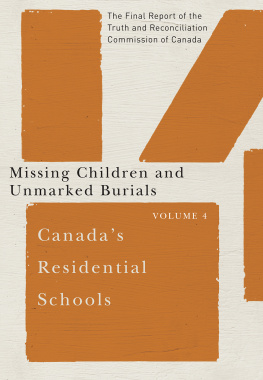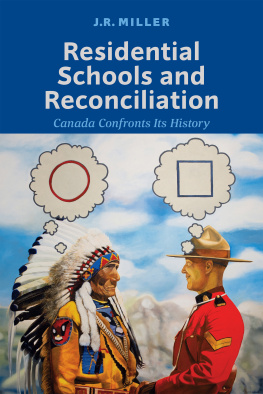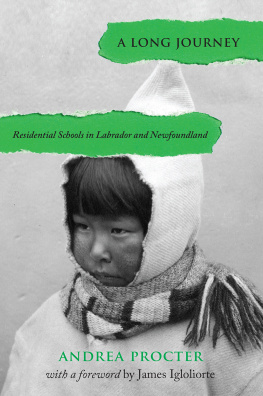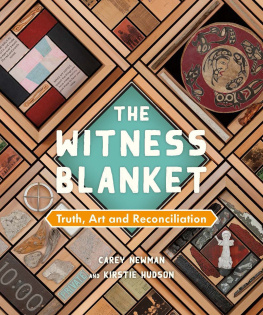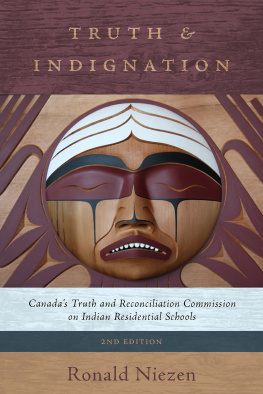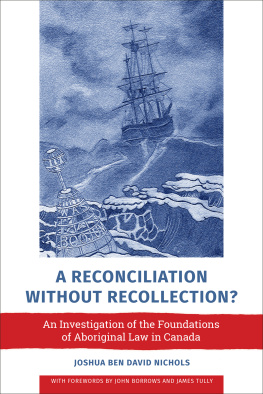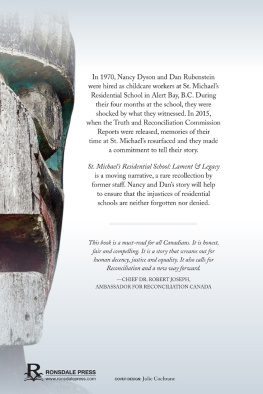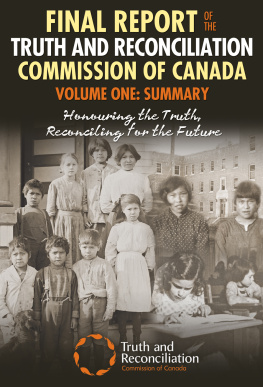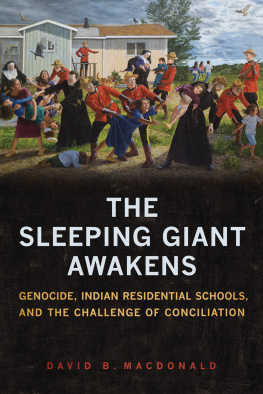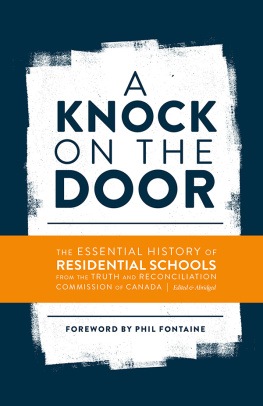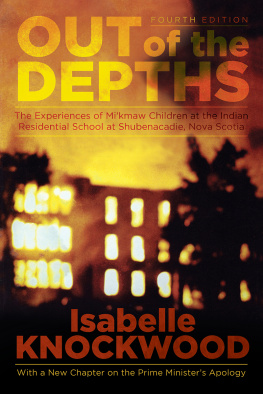Canadas Residential Schools
Volume 6

Canadas Residential Schools:
Reconciliation

The Final Report of the
Truth and Reconciliation
Commission of Canada
Volume 6
Published for the
Truth and Reconciliation Commission
by

This report is in the public domain.
Anyone may, without charge or request for permission, reproduce all or part of this report.
2015
Truth and Reconciliation Commission of Canada
Website: www.trc.ca
ISBN 978-0-7735-4661-5 (v. 6 : bound).
ISBN 978-0-7735-4662-2 (v. 6 : paperback).
Printed in Canada on acid-free paper
McGillQueens University Press acknowledges the support of the Canada Council for the Arts for our publishing program. We also acknowledge the financial support of the Government of Canada through the Canada Book Fund for our publishing activities.
Library and Archives Canada Cataloguing in Publication
Truth and Reconciliation Commission of Canada
[Canadas residential schools]
Canadas residential schools : the final report of the Truth and Reconciliation Commission of Canada.
(McGillQueens Native and northern series ; 8086)
Includes bibliographical references and index.
Contents: v. 1. The history. Part 1, origins to 1939 The history. Part 2, 1939 to 2000 v. 2. The Inuit and northern experience v. 3. The Mtis experience v. 4. The missing children and unmarked burials report v. 5. The legacy v. 6. Reconciliation
Issued in print and electronic formats.
ISBN 978-0-7735-4649-3 (v. 1, pt. 1 : bound).
ISBN 978-0-7735-4651-6 (v. 1, pt. 2 : bound).
ISBN 978-0-7735-4653-0 (v. 2 : bound).
ISBN 978-0-7735-4655-4 (v. 3 : bound).
ISBN 978-0-7735-4657-8 (v. 4 : bound).
ISBN 978-0-7735-4659-2 (v. 5 : bound).
ISBN 978-0-7735-4661-5 (v. 6 : bound).
ISBN 978-0-7735-9817-1 (v. 1, pt. 1 : ePDF).
ISBN 978-0-7735-9819-5 (v. 1, pt. 2 : ePDF).
ISBN 978-0-7735-9821-8 (v. 2 : ePDF).
ISBN 978-0-7735-9823-2 (v. 3 : ePDF).
ISBN 978-0-7735-9825-6 (v. 4 : ePDF).
ISBN 978-0-7735-9827-0 (v. 5 : ePDF).
ISBN 978-0-7735-9829-4 (v. 6 : ePDF).
ISBN 978-0-7735-4650-9 (v. 1, pt. 1 : paperback).
ISBN 978-0-7735-4652-3 (v. 1, pt. 2 : paperback).
ISBN 978-0-7735-4654-7 (v. 2 : paperback).
ISBN 978-0-7735-4656-1 (v. 3 : paperback).
ISBN 978-0-7735-4658-5 (v. 4 : paperback).
ISBN 978-0-7735-4660-8 (v. 5 : paperback).
ISBN 978-0-7735-4662-2 (v. 6 : paperback).
ISBN 978-0-7735-9818-8 (v.1, pt. 1 : ePUB).
ISBN 978-0-7735-9820-1 (v. 1, pt. 2 : ePUB).
ISBN 978-0-7735-9822-5 (v. 2 : ePUB).
ISBN 978-0-7735-9824-9 (v. 3 : ePUB).
ISBN 978-0-7735-9826-3 (v. 4 : ePUB).
ISBN 978-0-7735-9828-7 (v. 5 : ePUB).
ISBN 978-0-7735-9830-0 (v. 6 : ePUB)
1. Native peoplesCanadaResidential schools. 2. Native peoplesEducationCanada. 3. Native peoplesCanadaGovernment relations. 4. Native peoplesCanadaSocial conditions. 5. Native peoplesCanadaHistory. I. Title. II. Series: McGillQueens Native and northern series ; 8086
E96.5.T78 2016 | 971.00497 | C2015-905971-2
C2015-905972-0 |
Contents
Canadas Residential Schools
Volume 6
Introduction
To some people, reconciliation is the re-establishment of a conciliatory state. However, this is a state that many Aboriginal people assert has never existed between Aboriginal and non-Aboriginal people. To others, reconciliation, in the context of Indian residential schools, is similar to dealing with a situation of family violence. It is about coming to terms with events of the past in a manner that overcomes conflict and establishes a respectful and healthy relationship among people going forward. It is in the latter context that the Truth and Reconciliation Commission of Canada (TRC) has approached the question of reconciliation.
To the Commission, reconciliation is about establishing and maintaining a mutually respectful relationship between Aboriginal and non-Aboriginal peoples in this country. For that to happen, there has to be awareness of the past, acknowledgement of the harm that has been inflicted, atonement for the causes, and action to change behaviour.
We are not there yet. The relationship between Aboriginal and non-Aboriginal peoples is not a mutually respectful one. But we believe we can get there, and we believe we can maintain it. Our ambition is to show how we can do that.
In 1996, the Report of the Royal Commission on Aboriginal Peoples urged Canadians to begin a national process of reconciliation that would have set the country on a bold new path, fundamentally changing the very foundations of Canadas relationship with Aboriginal peoples. Much of what the Royal Commission had to say has been ignored by government; a majority of its recommendations were never implemented. But the report and its findings opened peoples eyes and changed the conversation about the reality for Aboriginal people in this country.
In 2015, as the Truth and Reconciliation Commission of Canada wraps up its work, the country has a rare second chance to seize a lost opportunity for reconciliation. We live in a twenty-first-century global world. At stake is Canadas place as a prosperous, just, and inclusive democracy within that global world. At the TRCs first National Event in Winnipeg, Manitoba, in 2010, residential school Survivor Alma Mann Scott said,
The healing is happeningthe reconciliation.... I feel that theres some hope for us not just as Canadians, but for the world, because I know Im not the only one. I know that Anishinaabe people across Canada, First Nations, are not the only
Reconciliation must support Aboriginal peoples as they heal from the destructive legacies of colonization that have wreaked such havoc in their lives. But it must do even more. Reconciliation must inspire Aboriginal and non-Aboriginal peoples to transform Canadian society so that our children and grandchildren can live together in dignity, peace, and prosperity on these lands we now share.
The urgent need for reconciliation runs deep in Canada. Expanding public dialogue and action on reconciliation beyond residential schools will be critical in the coming years. Although some progress has been made, significant barriers to reconciliation remain. The relationship between the federal government and Aboriginal peoples is deteriorating. Instead of moving towards reconciliation, there have been divisive conflicts over Aboriginal education, child welfare, and justice. The daily news has been filled with reports of controversial issues ranging from the call for a national inquiry on violence towards Aboriginal women and girls to the impact of the economic development of lands and resources on Treaties and Aboriginal title and rights. The promise of reconciliation, which seemed so imminent back in 2008 when the prime minister, on behalf of all Canadians, apologized to Survivors, has faded.
Too many Canadians know little or nothing about the deep historical roots of these conflicts. This lack of historical knowledge has serious consequences for First Nations, Inuit, and Mtis peoples, and for Canada as a whole. In government circles, it makes for poor public policy decisions. In the public realm, it reinforces racist attitudes and fuels civic distrust between Aboriginal peoples and other Canadians. Too many Canadians still do not know the history of Aboriginal peoples contributions to Canada, or understand that by virtue of the historical and modern Treaties negotiated by our government, we are all Treaty people. History plays an important role in reconciliation; to build for the future, Canadians must look to, and learn from, the past.
Next page

